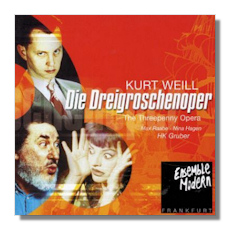
The Internet's Premier Classical Music Source
Related Links
- Weill Reviews
- Latest Reviews
- More Reviews
-
By Composer
-
Collections
DVD & Blu-ray
Books
Concert Reviews
Articles/Interviews
Software
Audio
Search Amazon
Recommended Links
Site News
 CD Review
CD Review
Kurt Weill

The Threepenny Opera
- Max Raabe (Macheath)
- Timna Brauer (Jenny)
- Sona MacDonald (Polly)
- HK Gruber (Peachum)
- Nina Hagen (Mrs. Peachum)
Ensemble Modern/HK "Nali" Gruber
RCA Victor Red Seal 74321-66133-2 DDD 2CDs 51:23, 31:00
Perhaps each decade deserves its own Threepenny Opera. The Thirties had the filmed version by G.W. Pabst, poorly paced and featuring a willowy but inhibited Lotte Lenya. The Fifties had the first English translation by composer Marc Blitzstein, which was simultaneously slangy and coy, and it featured the older, widowed, and more world-weary Lotte Lenya. Now in this post-modern age approaching the millennium, we have the Ensemble Modern. What are the results?
Mixed. It is the first production I've heard that credits the participation of Elizabeth Hauptmann for "translation," whatever that means. Translation from the English Beggars' Opera by John Gay? Or translation of Der Dreigroschenoper from the German back to English? She did have more to do with the penning of the work than writer Bertolt Brecht gave her credit. And the production tacks on the long-ignored "Lucy's Aria" at the end, a piece few Americans have ever heard. It also preserves the orchestral segments that occur after the songs, which wryly mirror the vocals.
Most of the performers hover above adequate. As Jenny, Timna Brauer's high tessitura suggests a younger, less worldly character than I'm accustomed to. Max Raabe is a competent Macheath, even threatening when he has to be. Sonna MacDonald is a believable Polly Peachum, naïve but acquiring rough edges as she grows wiser. She is particularly good in the Barbarasong where she sings of her sexual awakening. Her voice, although small, has some sense of vocal dramatics worth listening to.
HK Gruper should stick to conducting, for he is more annoying than arch as Jonathan Jeremiah Peachum. His gravelly voice, rather than adding color, simply grates. But the greatest miscasting has to be Nina Hagen as Mrs. Celia Peachum. The woman can't sing! She croaks, squeaks, howls, and whines her way through the role, nearly always off-key and most horrid. What were the producers thinking of? If they wanted a big name, why couldn't they have sprung for Marianne Faithful, who does great Weill? When Gruper and Hagen sing together, as in the Anstatt-Das-Song (Why Can't They Song), they roll their R's like schoolchildren learning Spanish. Keep your finger on your remote!
There are worthwhile elements in this recording, but its flaws are most disconcerting. My advice is to mine what you can from it, but investigate earlier Threepennies, like the 1955 Vienna State Opera version (Vanguard Classics OVC 8057) or the Americanized Blitzstein version, if you can find it.
Copyright © 2000, Peter Bates












